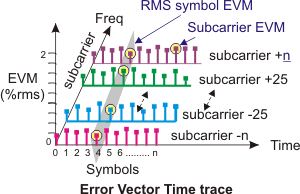Error Vector Time (DOCSIS 4.0 Upstream)
The trace shows the OFDM symbol and subcarrier EVM/MER vs. Symbol (time) and Subcarrier (frequency). The Error Vector Time trace enables you to easily attain information about the signal modulation quality as a function of the OFDM symbols.
The Error Vector Time trace provides the following data results: the subcarrier EVM/MER and the RMS average symbol EVM/MER. The trace analysis data includes preamble and payload data including all Preamble, Pilot, and Data subcarriers for the measurement burst. Unused subcarriers are blanked and not included in the measurement analysis. There is also a plot (default white line) of the RMS average symbol EVM/MER for each symbol in the measurement analysis.
This trace can be viewed in either MER or EVM mode (default is MER, Show MER on Error Vector Traces selected). It's often easier to see problems in EVM mode, because subcarriers with poor EVM spike up and stand out from the signal (as opposed to MER mode, where subcarriers with poor MER spike down and are easily lost in the signal).
MER display is limited to to 99 dB. If equalizer smoothing is OFF, most pilots will be maxed out at 99 dB MER because they are used to train the equalizer and become “perfect” by definition. For MER, higher numbers mean perfection. For EVM, lower numbers mean perfection. It’s often easier to see MER/EVM problems in EVM mode than in MER mode.
Although the DOCSIS 4.0 specification uses MER, you can convert to EVM using the following equation:
EVM% = power(10,-MER/20)*100
Or
MER = -20*log10(EVM% / 100)
When a marker is added to the trace, a banner of data appears at the top of the trace in green text. The marker results are described in the table below:
| Marker Results | Description |
|---|---|
|
specifies the marker OFDM symbol number. |
|
|
specifies the marker subcarrier index. |
|
|
This is the subcarrier EVM (%)/MER(dB) result for the marker subcarrier. |
|
|
This result is only available when showing EVM on traces. |
You can limit the number of symbols included in the measurement analysis data results using the Result Length, Measurement Interval, and Measurement Offset parameters.
Carrier phase drift will show up in the Error Vector Time trace, and not in the Common Pilot Error trace when Track Phase is cleared. Carrier phase drift will show up in the Common Pilot Error trace, but will be mostly removed from the Error Vector Time trace when Track Phase is selected.
Interpreting the Display
The y-axis ordinal is the MER magnitude (default is MER; deselect Show MER on Error Vector Traces to switch from MER to EVM), the x-axis ordinal is the OFDM symbol number, and the z-axis ordinal is the subcarrier index. This trace format groups subcarriers by symbol for all the symbols within the measurement burst. For example; symbol 2 shows all subcarriers associated with symbol 2.

Trace Color coding Scheme
A multi-color coding scheme is used to make it easy to visually identify common symbols, subcarriers, and data results within various OFDM Traces. This makes cross trace data comparisons and analysis easy to accomplish. Different colors are assigned to symbols representing a common subcarrier type including: Pilot and Data subcarrier types. Some common color scheme Traces include: Error Vector Spectrum, Error Vector Time, and IQ Meas.
You can also customize and re-assign Trace colors schemes, see the Display Preferences Color tab (click tab and select a new color for the active Mod Type element).
See Also
Available Trace Data (DOCSIS 4.0 Upstream)
